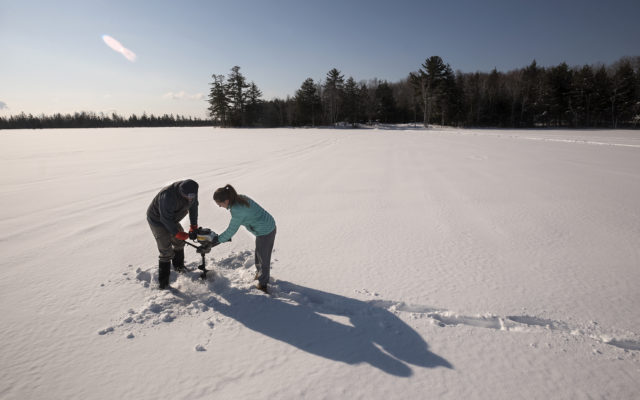
Here’s how you can catch more fish through the ice
As winter gets colder and the ice on local lakes and ponds gets thicker, more of us will waddle out there, drill a few holes and try to catch some fish.
Wouldn’t you love it if you knew how to catch even more?
Of course you would. And the Maine Department of Inland Fisheries and Wildlife wants you to do just that.
The DIF&W sent out a list of tips from state fisheries biologists designed to help all of us put more fish on the ice.
Here’s what they say you have to do:
— Don’t be afraid to fish close to shore where you may have better luck and can get out of the wind. For brook trout, jig with a Swedish Pimple and worm. — Fisheries Resource Supervisor Kevin Dunham of the Penobscot Region
— Find a fresh spot on a lake or pond. Anglers who explore and fish new shores that have not been fished yet usually have good consistent fishing and may find larger fish. — Fisheries Resource Supervisor Gregory Burr, Grand Lake Region
— Pay attention to bait size. If specifically targeting lake trout and other large predators, use large bait as that does work best. However, for all other species, try small- to medium-sized baitfish. Salmon, brook trout and warmwater fish species (bass, perch, crappie, etc.) won’t usually pass up a 2- to 3-inch snack. Larger (4- to 5-inch) baitfish are usually less desirable. — Fisheries Resource Supervisor David Howatt, Rangeley Lakes Region
— Learn to jig! — Fisheries Resource Supervisor James Pellerin, Sebago Lake Region
— If you are fishing for brook trout, fish shallow (in 1 to 5 feet of water), use small bait and fish over gravelly or rocky bottom. — Fisheries Resource Supervisor Jason Seiders, Belgrade Lakes Region
— If you are fishing for lake trout (togue), try fishing around points of land that extend into deeper water. Focus on water depths of 15-40 feet off these landmarks and use large smelt for bait. Large togue cruise these areas searching for food and can often be caught close to the surface as well as near bottom. — Fisheries Resource Supervisor Frank Frost, Fish River Lakes Region
— The most important component of a good early season ice fishing trip is safe ice. — Fisheries Resource Supervisor Tim Obrey, Moosehead Region
|DNP:true